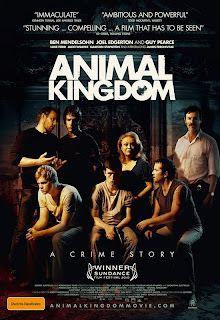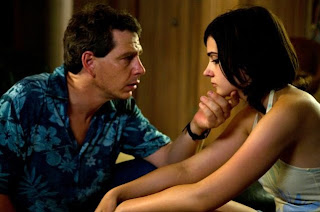
In keeping with the precedent set by Aqua Teen Hunger Force Colon Movie Film for Theaters, Tim and Eric's Billion Dollar Movie (trailer) continues the proud tradition of feature-length films based on Adult Swim shows that fail to live up to their pedigree. Now, I'm a fan of Tim Heidecker and Eric Wareheim's often disgusting, usually hilarious, and always bizarre Tim and Eric Awesome Show, Great Job! (as I am of Aqua Teen Hunger Force), but so many of the things that make the Tim-and-Eric schtick work at eleven-minute intervals on television demonstrate why it doesn't translate to an hour and a half on the silver screen.
For any out there who are unfamiliar, Tim and Eric Awesome Show, Great Job! ran from 2007 to 2010 as part of Adult Swim, the Cartoon Network's broadcast segment of after-hours, "adult-oriented" animated and live-action comedy shorts, alongside the likes of the aforementioned Aqua Teen, Sealab 2021, Robot Chicken, Frisky Dingo, Garth Marenghi's Darkplace, Metalocalypse, Childrens Hospital, and a metric assload of anime you couldn't pay me to watch. Each eleven-minute episode consisted of a hodgepodge of tenuously related (if that much) segments usually involving ugly people, disgusting food, and the awkward banality of Western late-capitalist existence, accomplished with all the low budgets, amateurish acting, and sloppy editing of public-access television or old VHS training videos. So obviously it was pretty great. With the help of a veritable cornucopia of regular collaborators (Zach Galifianakis, John C. Reilly, and Weird Al) and guest stars (ranging from Patton Oswalt, David Cross, and Fred Willard to Dave Navarro, Tom Skerritt, and the great Tommy Wiseau), Tim and Eric took pop-cultural tropes and narrative conventions and tore them apart by pushing them to the nth degree. They took the everyday and stretched it to the point of hilarious absurdity.
This was often a tought act to pull off even in its original format of eleven minutes' worth of skits, songs, and animation, so I can't say I'm that surprised that it didn't translate to the feature-length format. As anyone who's seen a representative selection of SNL-based films can tell you, characters and situations that work for a few minutes at a time often fall apart when transplanted into an hour-and-a-half-long, multi-act story. In this film's case, the story opens with the eponymous billion-dollar movie, Diamond Jim, which Tim and Eric have produced with the funding of the Schlaaang Corporation; it's a five-minute piece starring a Johnny Depp impersonator (Ronnie Rodriguez) wearing a diamond-encrusted suit who gives his true love a softball-sized diamond, and the money that didn't go into the film was spent on Tim and Eric's mansions, jewelry, douchey clothes and hair, orange tans, and personal guru, Jim Joe (Zack Galifianakis). The Schlaaang Corporation, represented by Tommy Schlaaang (Robert "shit from a duck's ass" Loggia) and Earle Swinter (William "dickless" Atherton), are understandably furious with their unmarketable product and demand the billion dollars returned or Tim's and Eric's heads on a silver platter. Our two "heroes" think they find a solution when they see an ad by shopping mall manager Damien Weebs (Will Farrell) offering a billion-dollar profit to anyone who can turn his decrepit mall around. They set out for the mall, which they find full of garbage, bizarre stores, equally bizarre denizens, and a man-eating wolf, but, in spite of these obstacles, Tim and Eric are determined to succeed.
This storyline offers a fair amount of potential for Tim and Eric's style of humor (especially the mall, of course, with the opportunity for lots of people and situations that could be funny for a few minutes without necessarily having to fit into a larger storyline). However, when the film got a laugh out of me it was almost never anything having to do with the plot, but rather isolated non-sequiturs of weirdness: the weird looks and terrible acting of their "Johnny Depp"; the announcement before Diamond Jim by "Chef Goldblum" (getting names wrong is a Tim-and-Eric staple going back to their first Adult Swim series, Tom Goes to the Mayor, which asked the question, "How many different ways can you misspell 'Tom Peters'?"); an ad for one of the mall's stores featuring Palmer "Sit on You" Scott; the weird appearances of Schlaaang's silent henchmen (Andy Spencer and Christopher Guckenberger), one of whom looks like God's botched attempt to replicate Mike Myers; and something as simple as the creepy, lingering smile of a delivery man (Harry Elmayan).
I wasn't surprised that Billion Dollar Movie could be funny in brief spurts, since that's exactly how Awesome Show operated, jumping briskly from one skit or interlude to the next and only needing to make them funny individually, without necessarily needing to make them cohere collectively. (Even the bits predicated on the ol' make-something-last-so-long-the-awkwardness-becomes-funny routine rarely overstayed their welcome.) However, the demands of feature-length storytelling, with a developing plot and defined characters, just don't gell with this style of comedy. One major flaw arising from this is the wide shifting from scene to scene of the roles that the Tim and Eric characters play: one minute Tim and Eric play the straight men against a crazy, comical character, the next they play the comical characters against a straight man, the next Tim plays it straight while Eric plays it crazy, the next vice versa. It makes sense to do this based on what each scene requires, but it doesn't based on what the story as a whole requires. Generally, the role of a straight man in a comedy is to be audience surrogate, the relatively normal "base line" through whom the humor is experienced. When the straight man changes unpredictably from scene to scene, it can disrupt how the audience absorbs what they're watching, as opposed to having a good idea where they stand with the characters when their roles are defined more consistently. In Billion Dollar Movie, we're constantly being asked to shift our perspective from Tim to Eric to third parties, and this weakens both the story and the overall humor.
In addition to such structural problems, Billion Dollar Movie also just isn't funny enough, even on a scene-by-scene basis. There are several scenes scattered throughout the film of Schlaaang and Swinter fuming at Tim and Eric's swindle and scheming to get back at them, scenes which seem to have been included less for humor than simply to remind the audience periodically of that element of the story. Awesome Show alums like John C. Reilly, Will Forte, and James Quall have roles of various sizes, but none of them are nearly as funny here as they were on that show. This is a particularly bitter disappointment in Reilly's case, whose Dr. Steve Brule was one of the highlights of Awesome Show; here he plays Taquito, a much put-upon mall denizen whose role is mostly limited to providing exposition and trying to milk a one-note gag of his being a sickly but kind-hearted Tiny Tim character. Perhaps the biggest unwelcome surprise was the difference in pace; while the show was brisk, sometimes to an almost manic degree, the film is often simply boring, with scenes dragging on with little comedic payoff. Having already established my Tim-and-Eric bona fides above as a fan of Awesome Show (and even of the drier, more story-based Tom Goes to the Mayor), I feel secure saying that Billion Dollar Movie just isn't that funny. It's not that I don't get the humor, because there just isn't all that much humor to get.
Trying to translate a piece of entertainment from one format to another is always a dicey proposition; that's especially the case when the new format is almost an order of magnitude longer than the original. Maybe the only way to translate the Tim-and-Eric magic into feature length was to follow the formula of the Jackass franchise and simply show one short skit or segment after another, like an hour-and-a-half-long episode of the show. I'm not saying that it was never possible for Billion Dollar Movie to have worked as a single, coherent narrative rather than a series of segments, I'm just saying that, given the film we got, I would rather have just watched an hour and a half of Awesome Show.







